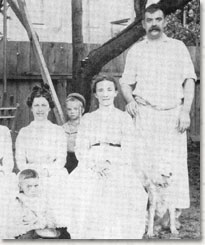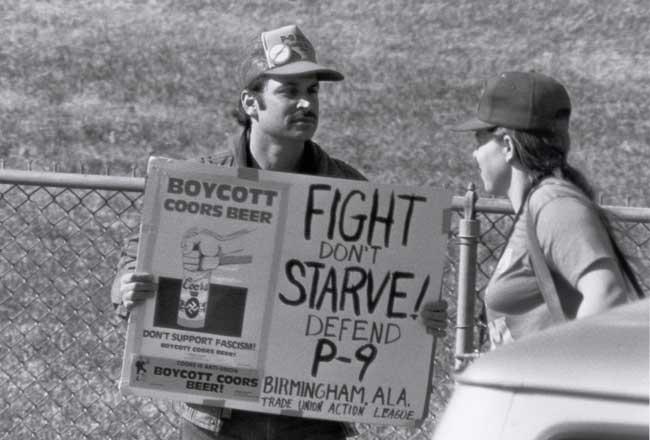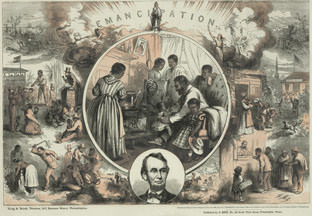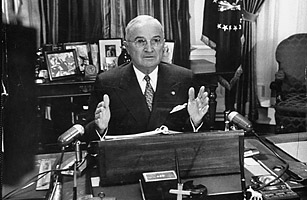
This Day in Labor History: April 17, 1905. The Supreme Court issues its horrendous decision in Lochner v. New York, overthrowing a state law on limiting working hours in bakeries. Let's talk about how the Court set the fight for justice back a generation--and how it might return! 

This landmark case gave official SCOTUS sanction to the idea of free contract between employer and employee.
Calling such laws, “unreasonable, unnecessary and arbitrary interference with the right and liberty of the individual to contract,” the Court effectively ruled that corporations have full rights to set any conditions of employment they chose.
This classic statement of the Gilded Age has inspired conservatives and outraged liberals ever since.
The rank exploitation of Gilded Age capitalism had increasingly moved large swaths of Americans to understand that basic protections must be granted if the nation was to remain socially stable and if future generations would grow up to be good moral Americans.
This attitude, while often paternalistic toward workers, had its benefits as workers really struggled to live lives of basic dignity in the Gilded Age.
The combination of extremely low wages, dangerous work, strikes met with state violence, and an economy constantly in turmoil thanks to the corruption of politicians and illegal machinations of capitalists meant that the American workforce had few options to improve their lives.
They tried but usually failed because of the combination of overwhelming combined state and corporate resistance, something Lochner would reinforce.
Accessing middle-class support for basic rights was necessary in order to achieve even the most rudimentary improvements in workers’ lives.
New York was one of these states with a strong Progressive movement. In 1895, the state passed the Bakeshop Act.
This law regulated the sanitary conditions of bakeries and read “no employee shall be … permitted to work in a biscuit, bread, or cake bakery or confectionery establishment more than sixty hours in any one week,” as well as more than ten hours in a day.
In 1899, Joseph Lochner, a baker in Utica, was indicted for violating the act by requiring employees to labor for more than 60 hours. He drew a $25 fine.
Not learning his lesson, he was charged again in 1901; this time the state fined him $50 (about $1500 today) and sentenced him to up to fifty days in jail if he did not pay the fine.
Lochner appealed this second fine, attempting to overturn the law. The Appellate Division of the New York Supreme Court upheld the law by a 3-2 vote and then the New York Court of Appeals, where he lost 4-3.
The Supreme Court was divided on this law. But by a 5-4 decision, the Court ruled in favor of Lochner and overturned the Bakeshop Act.
John Marshall Harlan, possibly the best justice of the era and often the only one with the welfare of the average citizen in mind, wrote one of his classic dissensions.
He wrote that it was “plain that this statute was enacted to protect the physical well-being of those who work in bakery and confectionery establishments.”
He went on, “If the end which the legislature seeks to accomplish be one to which its power extends, and if the means employed to that end, although not the wisest or best, are yet not plainly and palpably unauthorized by law, then the court cannot interfere.”
Oliver Wendell Holmes also dissented, using his ideology of limited court activism to accuse the majority of asserting their own economic preferences into the Constitution where they did not belong.
The majority in fact did that, but didn’t care. Rufus Peckham wrote the majority opinion.
He countered the argument of New York that “has a right to safeguard a citizen” by stating that citizens “are … able to assert their rights and care for themselves without the protecting arm of the State, interfering with their independence of judgment and of action.”
This really sums up the doctrine of free contract. Theoretically this sounds like the language of freedom because it places control over one’s life in his or her own hands. But of course such an analysis, which libertarians love today, completely ignores power relations.
No baker could assert his own rights because it was the employers who constricted those rights. When the option is a) work 65 hours or b) don’t eat, that’s not a freedom of choice.
Moreover, Peckham went into the health of working in a bakery, writing the law was unnecessary because “To the common understanding, the trade of a baker has never been regarded as an unhealthy one.”
Of course, such a judgment from a judge should not matter when deciding the constitutionality of the law–the question is whether it is constitutional, not whether the judge personally agrees on the merits of the law.
But the Supreme Court has long operated as little more than the assertion of personal political position as constitutional principle, a problem which plagues the Court today.
Moreover, the question of health and work in the Gilded Age was one of huge importance because work was so starkly unhealthy.
Compared to paint workers having their brains disintegrated through lead poisoning and radium workers dying from horrendous cancers, maybe bakers didn’t have it so bad, but that doesn’t mean that working in unsanitary conditions for long hours didn't have health effects.
Even when employers and states decided to something about workers dying or suffering grievous injuries on the job, it would take until the establishment of OSHA in 1970 before workplace health per se was really taken that seriously in the United States.
However, Lochner was also the peak of corporate rights superseding that of workers and the public.
The Muller v. Oregon decision three years later carved out room in the freedom of contract ideology for hours limitations on women workers, which began to slowly build toward the principle of government regulating the workforce.
From 1905 on, Lochner became the case that progressive labor activists such as Louis Brandeis sought to overturn.
Yet this would be a long fight lasting until the New Deal, with the Court reviving the Lochner doctrine in the 1923 case Adkins v. Children’s Hospital, declaring a Washington DC law setting minimum wages for women and children unconstitutional.
Conservatives would like to return to a Lochner-era America today and are working hard to make sure that happens.
And let's be clear--Lochner is returning as standard values in right-wing jurisprudence.
See this decision by a Trump judge overthrowing COVID closures in PA that cited Lochner.
slate.com/news-and-polit…
slate.com/news-and-polit…
My guess is that today, a Lochner revival would get 4 votes on the Court. We aren't that far away from a true return to the bad old days of the Gilded Age.
Back tomorrow to discuss the West Virginia Mine War of 1912.
• • •
Missing some Tweet in this thread? You can try to
force a refresh







